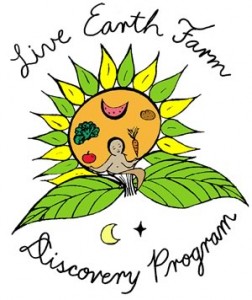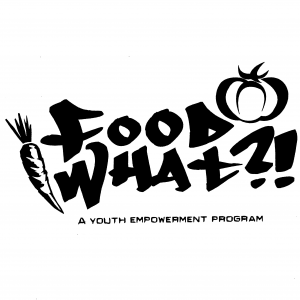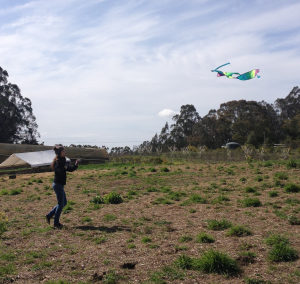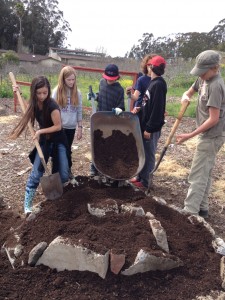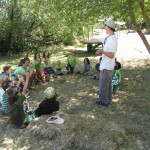 Summer Leadership Positions for Teens at Live Earth Farm
Summer Leadership Positions for Teens at Live Earth Farm
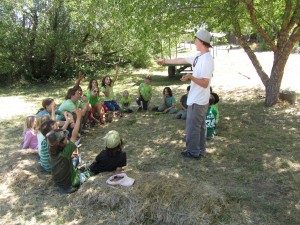 Local Teens are invited to work with The Live Earth Farm Discovery Program this summer. Since 2009 LEFDP has offered teen leadership positions at their Farm Camps. This year LEFDP is offering 4 weeks of summer camps with 3-4 positions for teens at each one. Teens will help guide campers through learning and play in our garden, fields and kitchen classroom as well as learning to care for our milking goats and laying hens.
Local Teens are invited to work with The Live Earth Farm Discovery Program this summer. Since 2009 LEFDP has offered teen leadership positions at their Farm Camps. This year LEFDP is offering 4 weeks of summer camps with 3-4 positions for teens at each one. Teens will help guide campers through learning and play in our garden, fields and kitchen classroom as well as learning to care for our milking goats and laying hens.
Watsonville, CA, May 7, 2013 – In the summer of 2013 LEFDP will host four weeks of summer camp at Live Earth Farm. They offer 3-4 Leader in Training (LIT) positions for teens, ages 13 and up. The camps are limited to 25 kids in order to create an intimate experience. LITs help to develop a compassionate multi-age community of young farmers, artists, foodies, naturalists, and environmentalists.
The summer begins with a week of Art on the Farm Camp June 17-21. June 24-28 will debut Young Farmer’s Camp for campers interested in planting, harvesting, preserving and cooking with the 50 different fruits and vegetables grown at Live Earth Farm. The first cohort of campers, age 3- 6 will play on the farm July 8-12 for Sprouts Camp. One more week of Art on the Farm Camp will run July 15-19.
The LIT positions at Live Earth Farm camps offer teens an opportunity to develop leadership skills, serve their community, and teach and learn farming, food preparation and ecology alongside their campers. Each teen is paired with 5-6 campers with whom they work all week long. Their guided responsibilities include enforcing water breaks, taking head counts, and leading community-building activities. Before camp teens participate in a training day with LEFDP staff. They learn about the developmental stages of the campers they will work with, familiarize themselves with the farm and farm projects, learn group management techniques, and community building games.
The Live Earth Farm Discovery Program (LEFDP) is a farm-based education non-profit organization in Watsonville, California. LEFDP makes seed to mouth, farm to fork, and child to community connections through a variety of hands-on educational programs serving the youth of Santa Cruz, Santa Clara and Monterey counties and beyond. A special emphasis is placed on reaching under served people in the community to bolster individual, community and environmental health. We welcome volunteers a number of different capacities. Please get in touch!
Jessica Ridgeway, Director
831-728-2032
LEFDPDirector@gmail.com
On facebook: LEFDP
On Twitter: @LEFDP
On Pinterest: LEFDP
On tumblr: LEFDiscoveryProgram
http://liveearthfarm.net/discovery-program/programs/farm-camps/
http://liveearthfarm.net/farm-camps-at-live-earth-farm/
 Please Welcome our new Education Programs Coordinator
Please Welcome our new Education Programs Coordinator
 Hi there, I’m Grace Chollar-Webb, the new Education Program Coordinator for the LEF Discovery Program… and I’m very happy to be here. I am working closely with Jessica Ridgeway, LEFDP’s director, as well as Farmer Tom, to learn the ropes and help orchestrate the myriad educational activities here on the farm. The most astounding thing about Live Earth Farm is feeling like it is my home after only a brief month of working here. This could have something to do with the fact that my childhood home is less than five miles down the road from my office, but I’m more certain it has to do with the warmth and kindness that exudes from everyone I have had the pleasure of working with so far.
Hi there, I’m Grace Chollar-Webb, the new Education Program Coordinator for the LEF Discovery Program… and I’m very happy to be here. I am working closely with Jessica Ridgeway, LEFDP’s director, as well as Farmer Tom, to learn the ropes and help orchestrate the myriad educational activities here on the farm. The most astounding thing about Live Earth Farm is feeling like it is my home after only a brief month of working here. This could have something to do with the fact that my childhood home is less than five miles down the road from my office, but I’m more certain it has to do with the warmth and kindness that exudes from everyone I have had the pleasure of working with so far.
I guess you could say I’m a home-body. I graduated from UCSC a month ago with a B.A. in Environmental Studies and Sustainable Education. I have been passionate about environmental education my entire college career, but it wasn’t until I transferred from Cabrillo to UCSC as a junior that I discovered my deeper enthusiasm for sustainable agriculture. So in addition to my knowledge of the local community, I hope to bring a pair of fresh eyes and hands to the Discovery Program, and to the issues of accessible education and the realities of outdoor learning.
Hope to meet you next time you’re on the farm!
Watsonville, CA, 5/15/2012 – The Live Earth Farm Discovery Program is a new nonprofit partner of 1% for the Planet, an alliance of over 1,380 member companies in 43 countries that give one percent of revenues to environmental causes.
 The Live Earth Farm Discovery Program is now eligible to receive donations from 1% member companies, placing them among a diverse, global network of environmental organizations. 1% member businesses fuel this non-profit network through their annual contributions, which totaled over $22 million in 2010. Partnership with 1% greatly expands the potential pool of funding to which The Live Earth Farm Discovery Program can look to for support.
The Live Earth Farm Discovery Program is now eligible to receive donations from 1% member companies, placing them among a diverse, global network of environmental organizations. 1% member businesses fuel this non-profit network through their annual contributions, which totaled over $22 million in 2010. Partnership with 1% greatly expands the potential pool of funding to which The Live Earth Farm Discovery Program can look to for support.
Newly approved, the Live Earth Farm Discovery Program contributes to a healthier planet by providing hands-on educational programs for youth, focused on the environmental and nutritional value of local, organic, and sustainable food and farms. Our goal is to reach out to all segments of the diverse, local community.
Over 2,300 non-profits worldwide are included in the 1% network, and over $70 million has been funneled to its nonprofit partners to date. “The intent of 1% for the Planet is to help fund these diverse environmental organizations so that collectively they can be a more powerful force in solving the world’s problems,” Yvon Chouinard, founder of 1% for the Planet.
“On the farm, our one-third acre Discovery Garden is an outdoor classroom, set within the greater, 120-acre working farm where our working fields, orchards and animals provide a learning experience that cannot be matched by most school garden programs. Learning about nutrition, food, farms, math, science, history and language arts from a variety of activities on the farm allows young people to exercise their bodies, connect with nature, and develop a “seed-to-fork” understanding of food, community and environment” Jessica Ridgeway, Director and Cofounder of LEFDP.
About 1% for the Planet
Started in 2002 by Yvon Chouinard, founder and owner of Patagonia, and Craig Mathews, owner of Blue Ribbon Flies, 1% for the Planet is a growing global movement of over 1,350 member companies in 43 countries that donate one percent of their sales to environmental organizations worldwide. Each day, more than one new business joins the 1% for the Planet movement. As a network, the 1% community has become a frontrunner in funding the work of environmental groups around the world. To learn more about 1% go to: www.onepercentfortheplanet.org
About New Nonprofit
Live Earth Farm began its Community Supported Agriculture program in 1996 including community events and education from the start. In 2007 a partnership between Live Earth Farm and Santa Cruz Montessori School gave life to the Live Earth Farm Discovery Program. With the SCMS weekly visits to LEF as a base, LEFDP expanded the educaitonal programs offered at LEF and gained 501(c)(3) non profit status in 2009. In this time LEFDP nearly doubled the number of visitors to the educational programs and established programs to reach out to ever more diverse segments of the local population.
We host over 1,000 youth visitors per year, including weekly visits from Santa Cruz Montessori School, bi-weekly visits from more than 30 classes a year, and four seasonal visits from a class of 35 English Language Learner students from E.A. Hall Middle School, a Wastonville school serving mostly children of low-income immigrant and migrant workers. A home-school cooperative of parents and kids also works and learns on our farm and in our garden once a month. Many of the school groups we host come to our farm for one-time visits (about 700 of our student visits per year), and some host our staff for in-class lessons at their schools. Classes range from pre school through 12th grade, though the majority of the students we reach are ages 5-14. We also host 3 on farm community events per year, which attract more than 200 people of all ages per event.
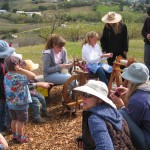 Notes from the Field Classroom: Sheep to Shawl!
Notes from the Field Classroom: Sheep to Shawl!
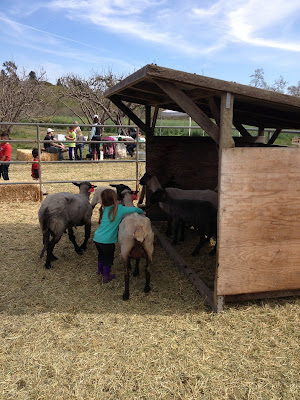 The morning of our 4th annual Sheep to Shawl dawned warm and sunny. The lower barn and surrounding area was prepped for throngs of people hoping to glimpse the sheep shearing, make some cool crafts and eat some delicious food!
The morning of our 4th annual Sheep to Shawl dawned warm and sunny. The lower barn and surrounding area was prepped for throngs of people hoping to glimpse the sheep shearing, make some cool crafts and eat some delicious food!
For the first time this year, we invited local artisan food vendors to the event. Companion Bakeshop, Penny Ice Creamery, and Storrs Winery set up in the field surrounding the sheep pen, intermingled with craft booths and vendors selling jewelry, wool, and clothing.
The sheep were sheared in the packing area with the spinning and weaving booths and our farm stand featuring Garden Variety Cheeses.
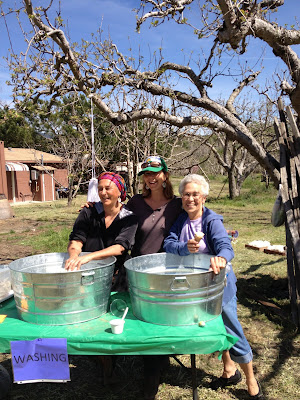 Children swarmed the craft booths, washing, dying, felting, knitting, and carding the wool from the sheep being sheared across the way. Parents sipped wine, and observed the talented crafters, admiring farm themed bottle cap earrings and other goods for sale.
Children swarmed the craft booths, washing, dying, felting, knitting, and carding the wool from the sheep being sheared across the way. Parents sipped wine, and observed the talented crafters, admiring farm themed bottle cap earrings and other goods for sale.
The aroma of chili and cornbread from Happy Girl Kitchen mixed with the intoxicating scent of strawberry cinnamon sparkling juice and lemon poppyseed ice cream from 3 of a Kind and Penny Ice Creamery.
The importance of community and art became apparent as new and old friends alike shared stories and laughs in the grass, as children ran through the fava bean fields with the dogs playing tag and as beautiful creations came out of the felting, and dyeing stations.
All in all, we had over 200 visitors and the Discovery Program made over $1500 dollars at the event to support our education programs for underserved members of our community! Thank you for all who participated!

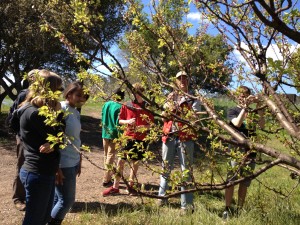 The focus of Wavecrest’s Field Studies in spring is “production and reproduction”. This means we have been spending a lot of time snuggling baby goats and learning about pollination.
The focus of Wavecrest’s Field Studies in spring is “production and reproduction”. This means we have been spending a lot of time snuggling baby goats and learning about pollination.
This rotation, we decided to focus specifically on flowers and insects on the farm and in the garden. We have learned about the “three P’s” (pollinators, predators and parasitoids) an intro to Integrated Pest Management on the farm, and native plant strips.
We visited UCSC’s Life Lab garden classroom, where we were inspired to make a path through our own garden, hiked around the farm twice–once with Farmer Tom to talk about cover crops and pollination and once with Grace and Peter to talk about native plants, IPM and beneficial insects.
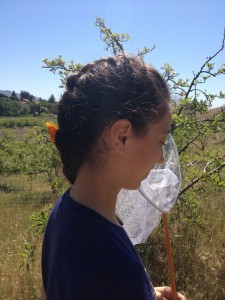 We have decided our garden project will be to design and implement a flower border around the garden, using both annuals and perennials and utilizing all the space we can!
We have decided our garden project will be to design and implement a flower border around the garden, using both annuals and perennials and utilizing all the space we can!
We have also been talking about birds on the farm and would like to put up the owl boxes that a previous Wavecrest class made, and will be visiting a local apiary and Driscoll’s to learn more about pollination and agriculture! It is going to be a busy spring!
I’ve never been a fan of cilantro, let’s just throw that out there before we get started with this recipe. It is a common belief that the aversion to cilantro is genetically passed down to us from our ancestors, and I know for a fact that my grandmother hates cilantro. But I have decided to overcome this sensitivity. There are just too many wonderful dishes that include cilantro that I didn’t want to avoid–salsas and salad dressings, enchiladas and falafel wraps…the list goes on and on.
I have been easing myself in to ordering dishes with cilantro and trying to accommodate it into meals that I make at home. But now it is cilantro season on the farm and I don’t want to miss out on any delicious opportunity, so I decided to dive right in. I decided to make the most flavorful thing that I could think of with my big bunch cilantro.
Cilantro pesto is a creative take on basil pesto, but you can use it in so many ways. It is delicious on pasta, as a topping for sandwiches, mixed with cottage cheese as a dip for tortilla chips, and even as a saute for chicken or fish. I made it the traditional way with pasta and it was amazing! It still might not be my favorite flavor, but cilantro is definitely growing on me!
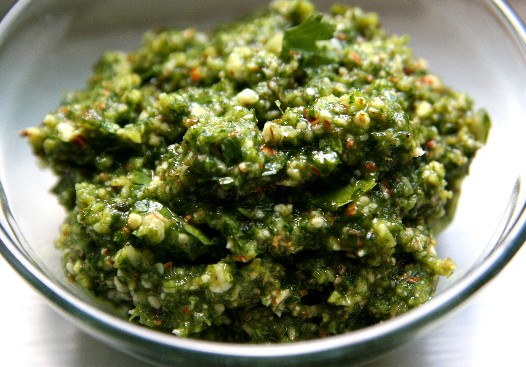
- Prep time: 15 minutes/Serves 4
You can add more serrano chiles if you like things hot. A full teaspoon will give you a nice, warm pesto.
Ingredients:
- 2 cups, packed, of cilantro, large stems removed
- 1/2 cup blanched almonds
- 1/4 cup chopped red onion
- 1/2 teaspoon chopped and seeded serrano chile
- 1 teaspoon Kosher salt
- 1/4 cup olive oil
- 1 package of fusili noodles
Directions:
For the pesto. . .
- Boil water for pasta.
- KIDS! Wash cilantro and remove stems.
- Chop onion and serrano.
- Add to a food processor,
- KIDS! Pulse the cilantro, almonds, onion, chile, and salt until well blended.
- With the food processor running, slowly add the olive oil in a steady stream.
- Add more oil as needed for your use.
Makes about 1 cup.
- Add pasta to boiling water, stir with a tablespoon of olive oil.
- Reduce to simmer, cook until tender (about 10 minutes).
- Strain pasta and pour into large bowl.
- KIDS! Mix with pesto and top with parmesen cheese.
Serve and enjoy!
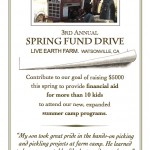 Spring Fund Drive 2013
Spring Fund Drive 2013
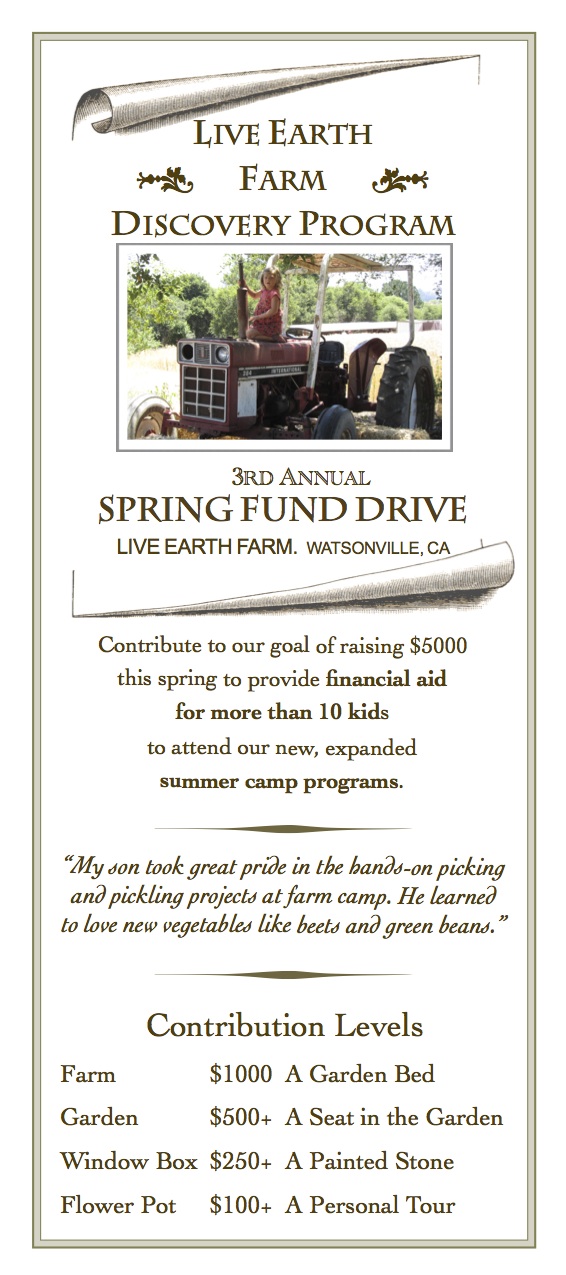 In Michael Pollan’s In Defense of Food, he entreats us to, “Eat food. Not too much. Mostly plants.” These instructions are so simple, even a 3rd grader can apply them to their own eating habits. In the fields of Live Earth Farm 3rd grader Olivia learned to plant, harvest and build a well proportioned plate of real, mostly plant based food.
In Michael Pollan’s In Defense of Food, he entreats us to, “Eat food. Not too much. Mostly plants.” These instructions are so simple, even a 3rd grader can apply them to their own eating habits. In the fields of Live Earth Farm 3rd grader Olivia learned to plant, harvest and build a well proportioned plate of real, mostly plant based food.
Problems like childhood obesity and diabetes are most prevalent in our local, underserved schools. This is why the Live Earth Farm Discovery Program aims to raise $5,000 this spring, which will provide financial aid for at least 10 students to attend farm camp – children like 3rd grader Olivia – in 2013.
In 2012, LEFDP welcomed over 1,500 children to Live Earth Farm. About 30% overall, but only about 5% of our summer campers came from local, underserved schools. We aim to increase the number of low-income students we will reach out to and serve in the coming year.
To help sponsor summer camp for students like Olivia, please make the greatest donation you can to the Live Earth Farm Discovery Program financial aid fund this spring. Please make a secure donation online using the Donate button on our website: http://liveearthfarm.net/discovery-program/support-us/
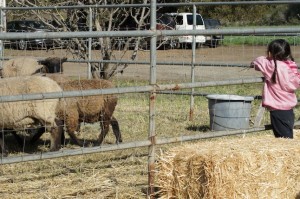 On her Live Earth Farm Discovery Program visit, Olivia and her classmates tasted and cultivated real food, outside, with their own hands. This is one great way to teach kids to like vegetables. Help us reach 10 more underserved students at camp this year, and help them develop healthier habits and healthier lifestyles through good food and outdoor play. Together we can make a difference for underserved young people living in Watsonville.
On her Live Earth Farm Discovery Program visit, Olivia and her classmates tasted and cultivated real food, outside, with their own hands. This is one great way to teach kids to like vegetables. Help us reach 10 more underserved students at camp this year, and help them develop healthier habits and healthier lifestyles through good food and outdoor play. Together we can make a difference for underserved young people living in Watsonville.
Food What?! Partners with LEFDP
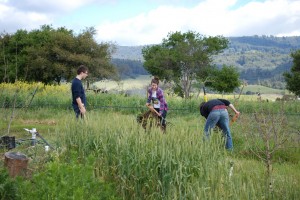 This spring Food What?! will run a pilot south county program at Live Earth Farm in Watsonville. This partnership between the Live Earth Farm Discovery Program and Life Lab’s FoodWhat Program will provide better access to the farm-based education and youth empowerment programs for under served youth in South County, an important goal of both organizations.
This spring Food What?! will run a pilot south county program at Live Earth Farm in Watsonville. This partnership between the Live Earth Farm Discovery Program and Life Lab’s FoodWhat Program will provide better access to the farm-based education and youth empowerment programs for under served youth in South County, an important goal of both organizations.
Watsonville, CA, March 19, 2013 – In early March, students from Pajaro Valley Unified and Watsonville High Schools and The Success Academy will arrive by city bus at Live Earth Farm for their first day of farm-based youth empowerment and hands-on nutrition education as part of the FoodWhat Spring Internship Program. In past seasons students from these schools have traveled to the FoodWhat Farm at Life Lab, located at UCSC. Now the students will get to participate in the same successful program closer to home, in the education fields of the Live Earth Farm Discovery Program. FoodWhat continues to serve mid and north county students at Life Lab the rest of the week.
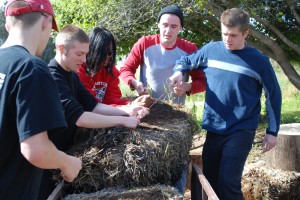 This partnership will support LEFDP’s mission of helping local under served youth build confidence in learning to be active caretakers of themselves, their community and their environment. In addition, the programs serve to further our mission in providing an arena for teens to participate in our programs. The teens will practice hands on organic farming and cooking skills, learn to make nutritious meals from the food they cultivate, and develop ownership of the process of bringing food from seed to plate.
This partnership will support LEFDP’s mission of helping local under served youth build confidence in learning to be active caretakers of themselves, their community and their environment. In addition, the programs serve to further our mission in providing an arena for teens to participate in our programs. The teens will practice hands on organic farming and cooking skills, learn to make nutritious meals from the food they cultivate, and develop ownership of the process of bringing food from seed to plate.
work all day
we plow the fields
mow the crops
sleep all night
work all day
we feed the cows
clean the stalls
sleep all night
the farmer
the farmer is strong
the farmer is healthy
the farmer is us
~Nate Saxton
Food
Grilled-cheese mayhem.
As I bite into the crunchy texture
of the grilled-cheese sandwich
the soft greasy melted cheese dissolves into the taste buds
An immense pleasure rises in my mouth
a sensation of joy overcomes me
Nothing has ever tasted to good
after a long day of knitting.
Apple delight.
After the cheesy goodness, nothing was better than
sugar-coated cinnamon sparkle golden apples
the abundant variety of flavors was like an amusement park
full of exciting things
fun places and intriguing spots.
~ Kevin Haaland
The leaves rustle softly in the breeze
the sun warm on my back
The air around me, the perfect temperature.
There are no clouds in the soft robin’s-egg-blue sky.
The wind carries the cheerful sound
Of the chirp and chatter of the birds
Everything is quiet.
I could sit here forever.
~Lilly Richards
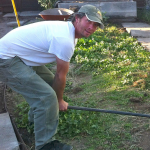 Notes from the Field, Classroom: Welcome Peter!
Notes from the Field, Classroom: Welcome Peter!
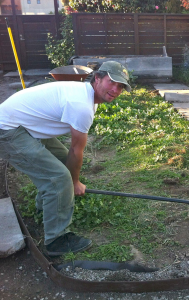 Welcome Peter Nelson; Our New Program Assistant
Welcome Peter Nelson; Our New Program Assistant
Peter is the newest member of our Discovery Program team. He has lived in the Monterey Bay area for the last 24 years. He has a history with many conservation and education nonprofits in the area and has had the opportunity to help create and build many school and community gardens around the Central Coast.
Most recently he was working in the Chinatown neighborhood in Salinas working with homeless and marginalized communities teaching job training, computer skills, and organic gardening. He has worked with people and plants in a variety of settings from the wilds of Ft. Ord to the Elementary School Gardens of Salinas, but this is his first time on a production scale farm. He is excited to meet and learn with all the amazing people that will visit Live Earth Farm and Discovery Garden.
“The first wealth is health” – Emerson

